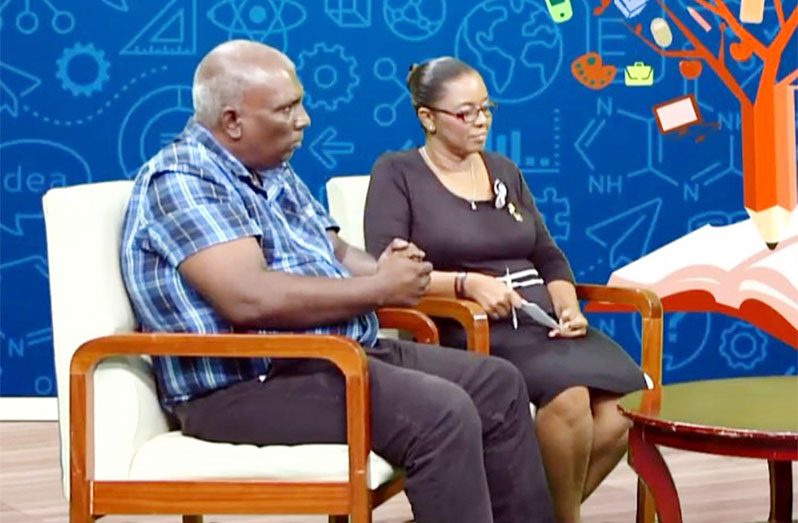–create divisiveness among educators, stymie delivery of education, senior educators say
–call for constructive dialogue; signal support for gov’t interventions to improve sector
IN a decisive move amidst the ongoing strike led by the Guyana Teachers’ Union (GTU) two senior educators have voiced their disapproval of the GTU’s leadership and strategies.
They argued for a return to negotiations with the government and constructive dialogue to ensure that the educational needs of the nation’s children are met without further disruption.
The Headmaster of Essequibo Islands Secondary School, Sheikh Ahmad and Headmistress of The Bishops’ High School, Shandrina Welcome-Lee, have publicly questioned the GTU’s credibility and leadership amidst the strike.
During a sit-down on Tuesday, the educators voiced their concerns, highlighting a deeper rift within the education community, touching on issues of union transparency, governmental support for education, and the moral imperative to prioritise students’ welfare above all.
With a career spanning over a quarter of a century and rooted in a deep family history of trade unionism, Ahmad brought a unique perspective to the current education crisis.
His decision not to participate in the strike was based on a holistic view of his responsibilities as an educator, the significant progress and support provided by the government, and a critical view of the GTU’s actions, especially during the pandemic.
Ahmad reminisced about his decision not to strike in 2018, a choice he repeated in 2024, emphasising the importance of teachers presence during critical examination periods for students.
“In 2018, I didn’t strike and in 2024 I’m not striking, primarily because…I consider my charges, my students, of paramount importance,” Ahmad said, highlighting his results-driven approach and the significant role of educators in the lead-up to exams such as the CSEC and NGSA.
The headmaster presented a direct comparison of his salary increments as evidence of government support, contrasting this with his view of the absence of the GTU’s substantive support during the COVID-19 pandemic.
Ahmad’s salary saw a significant increase, which he perceived as a reflection of the government’s commitment to education, stating,
“My net take-home is 259,000…an increase of over 42,000…about 19 per cent. And that’s the largest single increase in my entire career,” he said.
Further, Ahmad criticises the GTU’s response during the pandemic and its approach to unionism more broadly.
“We never saw GTU…with a mask, cleaning agent, or anything,” he remarked, questioning the union’s use of membership fees and its lack of visible support for teachers during a critical period.
Reflecting on the 2018 strike and the unresolved issues of teachers’ compensation, Ahmad suggests that the GTU’s current actions fail to address longstanding concerns effectively.
He advocated for the union to engage more directly with educators at the grassroots level, highlighting the need for realistic and constructive dialogue about the challenges facing the education sector.
“We recognise that there needs to be an increase in uniform allowance…But GTU’s issue is that they need to speak to teachers. You need to go at the grassroots level,” Ahmad insisted, highlighting the disconnect between union leadership and the everyday realities of teachers.
In his call for a return to classrooms and for continued negotiations, Ahmad underscored the importance of prioritising the education needs of the nation’s children over industrial action.
Ahmad also advocated for a more inclusive, and a dialogue-driven approach to addressing the sector’s challenges, since the strike is not the way forward, and a broader conversation is needed about the most effective ways to advocate for and support educators in Guyana.
On the other hand, Welcome-Lee focused on practical enhancements in educational delivery and infrastructure, thanks to government’s initiatives and investments.
DIVISIVE NATURE
She criticised the strike’s divisive nature within the teaching community and stressed the importance of personal choice and professional integrity in these challenging times.
Welcome-Lee’s plea for unity and professional respect among educators underscores a critical need for a cohesive approach to addressing certain issues.
Both educators applauded the government’s initiatives, such as simplifying administrative processes for teachers, giving direct financial grants to schools, and significant investments in educational technology and resources.
These measures, they argue, have directly benefitted students and teachers alike, enhancing the quality of education across Guyana.
As the strike continues to stir controversy and debate within the education sector, Ahmad and Welcome-Lee called for dialogue and for negotiations to continue.
According to them, there is a shared goal among educators, unions, and the government to foster an educational environment that prioritises the well-being and future of Guyana’s children.
Their statements serve as a rallying cry for educators to reconsider the impact of the strike on the nation’s progress in education and to seek a resolution that balances the needs of teachers with the imperative to educate and nurture the next generation.
A Partnership for National Unity + Alliance For Change (APNU+AFC) Member of Parliament Coretta McDonald, serving as General Secretary of the Guyana Teachers’ Union (GTU), is at the forefront of the strike.
McDonald has stated that potential salary deductions for participating teachers would not pose a problem, as “corporate sponsors” have committed to reimbursing affected educators.
However, specifics regarding these sponsors, the total funds pledged, and the planned distribution method remain undisclosed.



.jpg)








